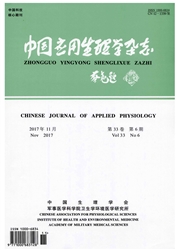

 中文摘要:
中文摘要:
目的:探讨瑞舒伐他汀对颈动脉粥样硬化患者单个核细胞CC类趋化因子受体2(CCR2)表达的影响及上游机制。方法:选择颈动脉粥样硬化患者20例。予瑞舒伐他汀5~20 mg/d治疗。在基线、3月时采集血标本,测定单核细胞趋化蛋白-1(MCP-1)及血脂水平;分离单个核细胞,流式细胞学检测单个核细胞上的CCR2表达;荧光定量逆转录PCR法检测CCR2、过氧化物酶体增生物激活受体(PPAR)βm RNA的表达;Western印迹法检测PPARβ蛋白的表达。结果:瑞舒伐他汀治疗3个月后,患者低密度脂蛋白胆固醇(LDL-C)水平明显降低(P〈0.01),MCP-1及单个核细胞CCR2表达显著下降(P〈0.05),PPARβm RNA及蛋白表达均较前增加(P〈0.05)。结论:瑞舒伐他汀可能通过PPARβ途径降低MCP-1,抑制单个核细胞CCR2的表达。
 英文摘要:
英文摘要:
Objective: To investigate the effect of rosuvastatin therapy on C-C chemokine receptor(CCR2)expression in mononuclear cells in patients with carotid atherosclerosis and explore the possible upstream mechanism. Methods: Twenty patients without previous statin treatment were enrolled. Rosuvastatin were given 5 to 20 mg / day for 3 months. At baseline and 12 weeks,lipid profile and plasma monocyte chemotactic protein-1(MCP-1) levels were examined. The m RNA and protein expressions of CCR2 in the mononuclear cells were measured with RT-PCR and flow cytometry,respectively. The m RNA and protein expression of peroxidase proliferator-activated receptor(PPAR β) were detected with RTPCR and Western blot,respectively. Results: After 3-months rosuvastatin treatment,the patients' low-density lipoprotein cholesterol(LDL-C)levels decreased significantly(P 0. 01). Compared with baseline,the m RNA and protein expressions of CCR2 in the mononuclear cells showed significantly decrease,as well as plasma MCP-1 levels(P 0. 05). Both m RNA and protein expressions of PPAR β in the mononuclear cells increased(P 0. 05). Conclusion: Rosuvastatin may attenuate MCP-1 / CCR2 through PPARβ upstream pathway.
 同期刊论文项目
同期刊论文项目
 同项目期刊论文
同项目期刊论文
 期刊信息
期刊信息
